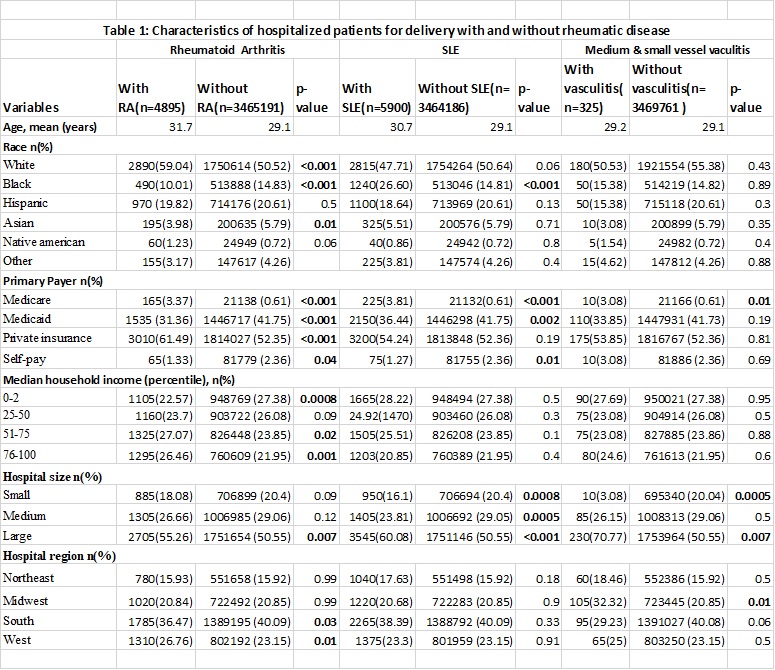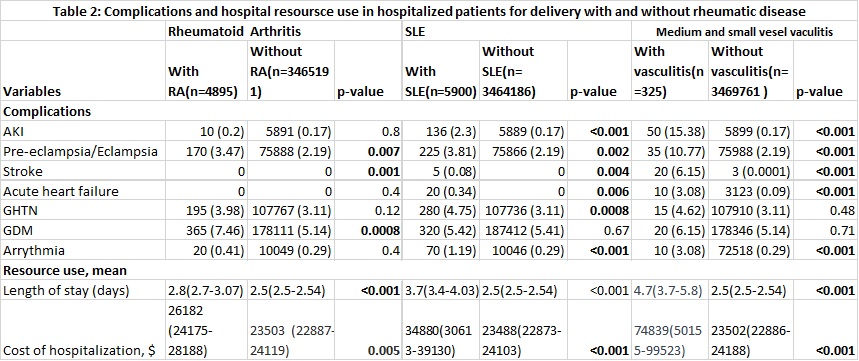Session Information
Date: Sunday, November 12, 2023
Title: (0460–0479) Reproductive Issues in Rheumatic Disorders Poster I
Session Type: Poster Session A
Session Time: 9:00AM-11:00AM
Background/Purpose: Systemic lupus erythematosus (SLE), rheumatoid arthritis (RA) & vasculitis are autoimmune rheumatic diseases (ARDs) with systemic involvement. Management of women with ARDs during pregnancy presents unique clinical challenges. Previous studies have indicated that individuals with ARDs are at an increased risk of experiencing significant cardiovascular (CV) events during delivery. Long-term CV risks associated with ARDs are well-documented but less is known about the acute CV complications during delivery. This study aims to investigate the outcomes of CV complications during delivery hospitalizations for women with ARDs.
Methods: NIS (2016-2019) was used to identify delivery hospitalizations among birthing individuals with diagnoses of SLE, RA and systemic vasculitides (medium & small vessel vasculitis) using International Classification of Diseases (ICD-10) codes. The primary outcomes were CV events such as preeclampsia, peripartum cardiomyopathy (PPCM), heart failure (HF), stroke, cardiac arrhythmias and venous thromboembolism (VTE). We also assessed mortality, length of stay and total cost of hospitalization. Statistical analysis was performed in STATA v.17.A multivariable logistic regression model was used to understand the association between ARDs and acute peripartum cardiovascular complications. Statistical significance was defined by the two-sided t-test with a p value < 0.05.
Results: We identified 3,470,086 weighted delivery hospitalizations [mean age 29.14 years, 95% Confidence interval (CI), 29.05-29.24)]. Among them, 5900(0.17%) had SLE, 4895(0.14%) had RA, and 325(0.009%) had vasculitis. After adjusting for age, race, insurance, income and co-morbidities; SLE remained an independent risk factor for peripartum cardiovascular complications such as preeclampsia (OR 1.5; 95% CI, 1.1-2.1), arrhythmia (OR 3.17; 95% CI, 1.73-5.79), and venous thrombosis (OR 8.4; 95% CI, 2.9-22.1). Vasculitides was identified as an independent risk factor for preeclampsia (OR 4.7; 95%CI, 2-11.3), stroke (OR 513.3; 95% CI, 114-2284), heart failure (OR 24.17; 95% CI, 4.68-124.6) and peripartum cardiomyopathy (OR 66.7; 95% CI, 8.7-509.4. However, RA was found to be a risk factor for pre-eclampisa only(OR 1.5; 95% CI, 1.05-2.1).
The study also revealed significantly higher in-hospital mortality among pregnant women with SLE (0.17% vs. 0.0001%, p< 0.001) and vasculitis (1.54% vs. 0.0001%, p< 0.001) compared to women without ARDs. Individuals with SLE had a longer mean length of hospital stay compared to those without SLE (3.7 days vs. 2.5 days, p< 0.001), as did individuals with vasculitis compared to those without vasculitis (4.7 days vs. 2.5 days, p< 0.001). The mean cost of hospitalization was also higher for pregnant individuals with RA ($26,182 vs. $23,503, p=0.005), SLE ($34,880 vs. $23,488, p< 0.001), and other vasculitis ($74,839 vs. $23,502, p< 0.001) compared to individuals without these diseases.
Conclusion: This study found that SLE & vasculitis were associated with increased risk of cardiovascular complications during pregnancy and delivery along with longer duration of hospital stay and higher cost of hospitalization.
To cite this abstract in AMA style:
Shrestha K, Subedi P, Ghimire M, Poudel S, Ghimire K, Parvatheneni S, Dandamudi M, Pedraza L, Brito L, Gandrabur L. Acute Cardiovascular Events During Pregnancy and Delivery in Patients with Autoimmune Rheumatic Diseases (ARDs): An Analysis of National Inpatient Sample [abstract]. Arthritis Rheumatol. 2023; 75 (suppl 9). https://acrabstracts.org/abstract/acute-cardiovascular-events-during-pregnancy-and-delivery-in-patients-with-autoimmune-rheumatic-diseases-ards-an-analysis-of-national-inpatient-sample/. Accessed .« Back to ACR Convergence 2023
ACR Meeting Abstracts - https://acrabstracts.org/abstract/acute-cardiovascular-events-during-pregnancy-and-delivery-in-patients-with-autoimmune-rheumatic-diseases-ards-an-analysis-of-national-inpatient-sample/


